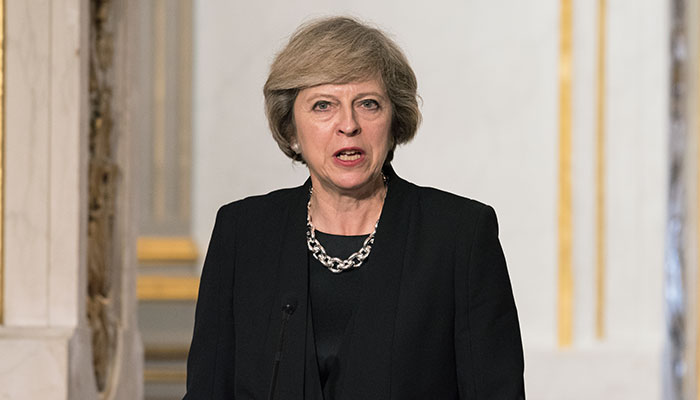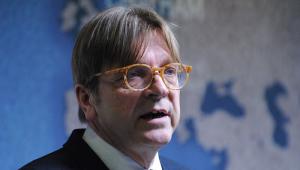web_theresamay_shutterstock_456468121.jpg

UK prime minister Theresa May
Yesterday, UK prime minister Theresa May delivered her much-awaited landmark speech on Britain's exit from the European Union. After months of offering nothing more than vague statements on how “Brexit means Brexit”, the hour-long address finally brought clarity on key issues including the single market, immigration and whether the British parliament will have a final vote on any Brexit deal reached.
Reactions around the UK, which remains split on the issue, varied between the different sides of the debate. But how was her tough rhetoric received by key figures in the European Union, especially in light of May’s threats that attempts to punish Britain for leaving would be an “act of calamitous self harm”?
As May’s priorities lie with British interests, the EU’s top Brexit negotiator Michel Barnier tweeted that he will be focused on getting the “right deal” for the EU’s remaining 27 member states.
He warned that an agreement allowing for an “orderly exit” will be a “prerequisite for future partnership”, and said he is ready to start negotiating as soon as the UK triggers the formal process for leaving, known as article 50, which May has signalled she will do in March.
Agreement on orderly exit is prerequisite for future partnership. My priority is to get the right deal for EU27. #Brexit
— Michel Barnier (@MichelBarnier) 17 January 2017
Ready as soon as UK is. Only notification can kick off negotiations. #Brexit
— Michel Barnier (@MichelBarnier) 17 January 2017
Also on Twitter, president of the European Council Donald Tusk cautiously welcomed May’s speech as “realistic”. He later added that it "proves that the unified position of 27 Member States on the indivisibility of the Single Market was finally understood and accepted by London".
He continued: "It would be good if our partners also understood that there will be no place for pick-and-choose tactics in our future negotiations. At the same time I want to underline, that we took note of the warm and balanced words of Prime Minister May on European integration, which were much closer to the narrative of Winston Churchill than that of the American President-elect Trump."
Sad process, surrealistic times but at least more realistic announcement on #Brexit. EU27 united and ready to negotiate after Art. 50.
— Donald Tusk (@eucopresident) 17 January 2017
His counterpart in the EU executive, president of the Euroepan Commission Jean-Claude Juncker, said he had told the UK prime minister in a phone call yesterday evening that the EU is not "in a hostile mood".
"We want a fair deal with Britian and a fair deal for Britian, but a fair deal means a fair deal for the European Union too. Our basic position is the same, we will start to negotiate after the triggering of article 50. Then we will see."
MEPs, however, were less reserved. Guy Verhofstadt, the Belgian politician in charge of Brexit talks for the parliament, tweeted:
Britain has chosen a hard Brexit. May's clarity is welcome—but the days of UK cherry-picking and Europe a la cart are over.
— Guy Verhofstadt (@GuyVerhofstadt) 17 January 2017
He later said that suggesting Britain could cut corporate taxes if a deal was not struck was “not very helpful”.
“I think it creates an illusion that you can go out of the single market and the customs union and you can cherry pick and still have a number of advantages.
“I think this will not happen. We shall never accept a situation in which it is better to be outside the single market than be a member of the EU.”
His colleagues from Sweden, Belgium and Germany added:
UK leaving the single market will come at a large cost. Negotiating new free trade deals with others to compensate won't be any easy task!
— Christofer Fjellner (@Fjellner) 17 January 2017
The European Union is not a menu where the #UK can freely pick and choose to their liking. #Brexit
— Kathleen Van Brempt (@kvanbrempt) January 17, 2017
An Island goes astrey. Let's just hope that the oldest parliament in the world doesn't sacrifice the great history of its country. #brexit
— Jan Philipp Albrecht (@JanAlbrecht) 17 January 2017
Key figures in some member states also criticised May’s position. French finance minister, Michael Sapin, told reporters the government was “helpless” in the face of Brexit and was “improvising” its departure.
“You might have thought that certain people had prepared for this,” he said. “No one was prepared. You can see very well they are improvising, with flip-flopping between accommodating positions... and harder positions, even a ‘hard’ Brexit.”
German foreign minister Frank-Walter Steinmeier welcomed the “clarity” in May’s speech and her desire to seek a “positive and constructive” partnership with the EU.
“We, too, want relations that are as good and close as possible and based on mutual trust. We are hoping for constructive negotiations to this end.”
His remarks followed an intervention from German prime minister Angela Merkel before May’s speech. She reportedly agreed Britain should not be able to pick and choose what features of EU membership it wanted to keep, which would endanger the single market.
Former Swedish foreign minister and prime minister Carl Bildt, however, thought many member states were likely dismayed to hear May’s announcements:
I regret the approach the UK government has taken. I think most of the EU would have preferred a closer relationship with the UK. #wef17
— Carl Bildt (@carlbildt) 17 January 2017













